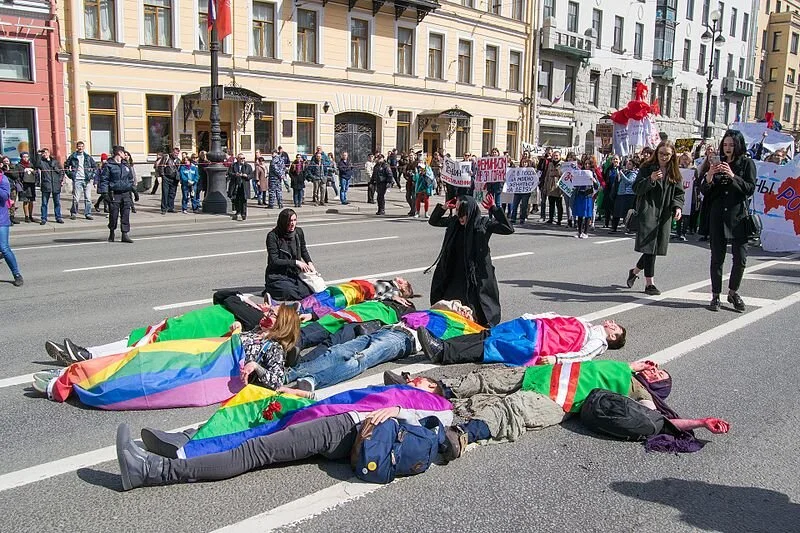OPINION: Chechen Gay Purges Constitute Genocide
Liam Scott (SFS ’23) is a guest writer for the Caravel's opinion section. The content and opinions of this piece are the writer’s and the writer’s alone. They do not reflect the opinions of the Caravel or its staff.
LGBT activists in Chechnya protest violence against the gay community. (Wikimedia Commons)
The government of Chechnya, a Russian autonomous region, infamously began to purge gay people in 2017. During the purges, gay individuals are rounded up by the Chechen police after being reported by friends or family members. Those detained are often interrogated, tortured, and even murdered. If they are released, they sometimes face murder at the hands of their own families in so-called “honor killings” to protect the family’s reputation. Since the beginning of 2019, more than 100 gay men have been victims of these purges.
Although these purges have received limited attention from the media and the international community, they are a gross human rights violation that constitutes attempted genocide.
The United Nations ratified the Genocide Convention in the aftermath of the Holocaust amid rampant platitudes of “never again.” According to the Genocide Convention, genocide refers to “acts committed with intent to destroy, in whole or in part, a national, ethnical, racial or religious group.” These acts may include, but are not limited to, “killing members of the group” or “causing serious bodily or mental harm to members of the group.” Attempted genocide and conspiracy to commit genocide are punishable offenses alongside genocide.
Sexuality, however, does not fall directly under the classes protected by the Genocide Convention, which should be revised to encompass groups persecuted based on sexuality. The Chechen gay purgues, however, also constitute an attack based on nationality.
Chechen leader Ramzan Kadyrov frequently argues that Chechnya does not have any gay people. “We don't have those kinds of people here. We don't have any gays. If there are any, take them to Canada,” he said.
Gay people are not considered to be Chechen. The official government stance that gay people do not exist in the country implies that gay people in Chechnya are not Chechen in terms of nationality, though they may technically be citizens. While the government does not kill all gay people they kidnap, the extermination of the gay community in Chechnya has gone unchecked by authorities. The attacks against gay men in Chechnya have clearly met the definition of genocide by causing “serious bodily or mental harm” to members of this group, as implied by Chechen authorities.
Proving intent, however, is more challenging and has historically slowed the international community in condemning mass atrocities as genocide and prosecuting it in court. Nevertheless, comments from Kadyrov imply a certain amount of intent. He has referred to gay people as “devils,” “for sale,” and “subhuman,” rhetoric that is typical of genocide. He also said, “To purify our blood, if there are any here, take them [to Canada].” This narrative of “purity” has tacitly condoned the extermination of gay people in Chechnya.
The international community should condemn this atrocity as genocide. Even if sexual orientation is not protected under the Genocide Convention (and even though it should be), the atrocity also falls under persecution based on a skewed perception of nationality. Unfortunately, if history is any indicator, we can expect the murders to continue as the international community remains complacent.
Have a different opinion? Write a letter to the editor and submit it via this form to be considered for publication on our website!

